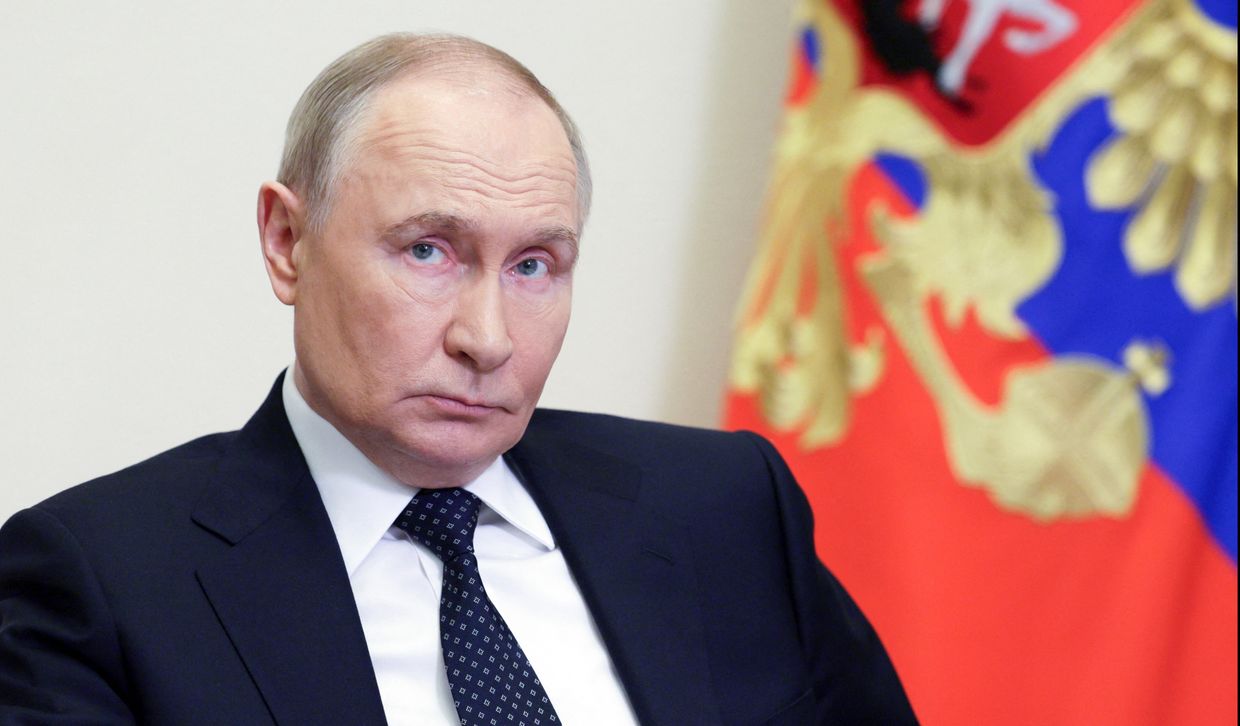Vue normale
-
NYT > World News
-
Napoleon’s Brooch, Lost as He Fled Waterloo, Sells for $4.4 Million
The diamond-encrusted jewel, which the 19th-century French emperor wore on his hat, was lost along with other valuables as he retreated from his final battle.
-
NYT > World News

-
As Belgium Races to Save U.S.A.I.D. Contraception, Some Supplies Are Reported Ruined
The Belgian government is in talks with the Trump administration to save birth control stranded in a warehouse, but another shipment has been incorrectly stored.
As Belgium Races to Save U.S.A.I.D. Contraception, Some Supplies Are Reported Ruined

© Hilary Swift for The New York Times
-
Euromaidan Press

-
Five unidentified drones flew over Belgium’s Doel nuclear plant
Three unidentified drones flew over Belgium’s Doel nuclear power plant in the evening of 9 November, according to Reuters, citing energy company Engie. Later, Politico reported, also referring to Engie, that a total of five drones were spotted flying over the nuclear power station that evening. The incident added to a growing wave of drone sightings across Belgian and broader EU airspace, with recent activity concentrated near military sites, civilian airports, and critic
Five unidentified drones flew over Belgium’s Doel nuclear plant

Three unidentified drones flew over Belgium’s Doel nuclear power plant in the evening of 9 November, according to Reuters, citing energy company Engie. Later, Politico reported, also referring to Engie, that a total of five drones were spotted flying over the nuclear power station that evening.
Doel plant latest in string of drone sightings
Reuters cited a spokesperson from Belgian energy firm Engie, who said the drones did not disrupt the Doel plant’s operations. Authorities were informed immediately.
"Initially we had detected three drones, but then we saw five drones. They were up in the air for about an hour," Engie spokesperson Hellen Smeets told Politico on 10 November, adding that the first report of the three drones came around 10 p.m. yesterday.
Politico reports that earlier in the evening, Liège Airport briefly suspended air traffic after several drone sightings, halting flights around 7:30 p.m. before resuming operations less than an hour later.
Government links drone threats to Russia
On 5 November, Belgian Prime Minister Bart De Wever called an emergency meeting of the National Security Council in response to the rising number of drone intrusions. Belgian intelligence agencies blame Russia for the incidents, according to Suspilne. As a result, authorities decided to bolster the National Air Security Center (NASC) and review anti-drone measures.
-
Euromaidan Press

-
UK deploys anti-drone forces to Belgium after suspected Russian drone incursions
Britain is deploying military personnel and equipment to Belgium after a series of drone incursions disrupted air traffic and raised fears of Russian hybrid operations, the BBC reported on Sunday. A growing number of unexplained drone incursions across Europe in recent months has alarmed governments and aviation authorities. Sightings in Belgium, Sweden, Norway, and Denmark have disrupted flights and raised fears of Russian hybrid activity aimed at testing air defense
UK deploys anti-drone forces to Belgium after suspected Russian drone incursions

Britain is deploying military personnel and equipment to Belgium after a series of drone incursions disrupted air traffic and raised fears of Russian hybrid operations, the BBC reported on Sunday.
A growing number of unexplained drone incursions across Europe in recent months has alarmed governments and aviation authorities. Sightings in Belgium, Sweden, Norway, and Denmark have disrupted flights and raised fears of Russian hybrid activity aimed at testing air defenses and spreading uncertainty.
UK Chief of Defence Staff Sir Richard Knighton said the move followed a request from his Belgian counterpart earlier in the week. He called it “plausible” that the drones were ordered by Moscow, though no evidence has been confirmed.
Belgium’s main airport, Zaventem, was briefly closed on Thursday after drones were spotted nearby, while others were seen over a military base.
Defence Secretary John Healey said the deployment showed the importance of allied coordination “to defend, deter and protect our critical infrastructure and airspace.”
Members of the Royal Air Force’s 2 Force Protection Wing, previously used in anti-drone operations during the 2024 Paris Olympics, are expected to take part. Germany has also pledged support with anti-drone measures.
The incidents forced Brussels Airlines to cancel or divert dozens of flights, affecting some 3,000 passengers.
Belgian Defence Minister Theo Francken acknowledged there was no proof of Russian involvement but said the threat had grown into a “serious” regional issue affecting both civilian and military infrastructure.
While Moscow denies involvement, European officials say the incidents fit a broader pattern of covert pressure tactics linked to the war in Ukraine.
Read also
-
Belgian army gives orders to shoot down drones over military bases after 3 consecutive nights of sightings
-
Belgium admits it couldn’t stop drones over F-35 base reportedly storing US nuclear weapons
-
Unidentified drones repeatedly breach airspace over Belgium’s F-35 site storing US nukes — suspects not found
-
Euromaidan Press

-
“War profiteer” Norway urged to guarantee stalled EU reparations loan for Ukraine
Pressure is building in Norway to use its vast sovereign wealth fund to help move forward the European Union’s stalled €140 billion loan for Ukraine - a proposal now gaining traction as part of efforts to overcome Belgium’s objections to using frozen Russian assets. The EU’s proposed reparations loan would tap into about €190-210 billion in frozen Russian state assets held in Europe to use as collateral to finance Ukraine’s recovery and budget needs. Legal and politic
“War profiteer” Norway urged to guarantee stalled EU reparations loan for Ukraine

Pressure is building in Norway to use its vast sovereign wealth fund to help move forward the European Union’s stalled €140 billion loan for Ukraine - a proposal now gaining traction as part of efforts to overcome Belgium’s objections to using frozen Russian assets.
The EU’s proposed reparations loan would tap into about €190-210 billion in frozen Russian state assets held in Europe to use as collateral to finance Ukraine’s recovery and budget needs. Legal and political disputes, led by Belgium, where most assets are held by the clearing house Euroclear, have delayed the plan.
The idea of Norway stepping in to guarantee part of the loan has revived debate over the country’s wartime windfall. After overtaking Russia as Europe’s main gas supplier, Norway earned roughly €109 billion in extra revenues from surging prices in 2022-2023, prompting accusations it had become a “war profiteer.”
Several Norwegian parties, including those aligned with Prime Minister Jonas Gahr Støre’s governing bloc, have urged Oslo to help “break the impasse.” Opposition politicians argue that Norway’s €1.8 trillion fund gives it the financial strength and moral duty to act.
“Norway has the means to guarantee a loan that would help Ukraine defend itself,” said Guri Melby, leader of the opposition Liberal Party. Greens leader Arild Hermstad added that Norway’s profit from the war made such support “a moral obligation.”
The proposal, first floated by two Norwegian economists in Denmark’s Politiken and endorsed by Danish Prime Minister Mette Frederiksen as “a great idea,” has since entered mainstream discussion in Oslo.
Støre has ordered a “full review” of possible involvement, while Norway’s finance ministry said it is “closely monitoring the situation and continuing dialogue with the EU.”
Norway has already committed 275 billion kroner (€27 billion) in civil and military aid to Ukraine through 2030. While officials stress there are no current plans for Oslo to act as a single guarantor, the debate underscores how Europe’s wealthiest energy producer is being drawn deeper into discussions on how to fund Ukraine’s war effort.
EU leaders are expected to revisit the issue in the coming months as Brussels looks for ways to meet Kyiv’s €55 billion funding needs for the next two years without adding pressure to national budgets.
-
Euromaidan Press

-
Sitting on €193B in Russian cash, Belgium blocks crucial €140B loan to Ukraine
Belgium is blocking a €140 ($160.7) billion loan mechanism to finance Ukraine’s war effort—despite Brussels holding €193 ($221.5) billion in frozen Russian central bank reserves. The Commission called emergency talks for Friday after negotiations collapsed this week. The breakdown comes as Ukraine faces a spring 2026 budget crisis. The country’s Finance Ministry projects needing $74.8 billion over 2026-2027, with only half that amount currently covered by confirm
Sitting on €193B in Russian cash, Belgium blocks crucial €140B loan to Ukraine

Belgium is blocking a €140 ($160.7) billion loan mechanism to finance Ukraine’s war effort—despite Brussels holding €193 ($221.5) billion in frozen Russian central bank reserves.
The Commission called emergency talks for Friday after negotiations collapsed this week.
The breakdown comes as Ukraine faces a spring 2026 budget crisis. The country’s Finance Ministry projects needing $74.8 billion over 2026-2027, with only half that amount currently covered by confirmed international support.
The frozen assets loan mechanism is the primary tool to close the financing gap. Without it, EU member states would need to finance Ukraine’s budget shortfall directly from national treasuries—a politically toxic option after pandemic spending strained government budgets.
The standoff tests whether Western democracies can sustain Ukraine support when it requires political risk-sharing, not just symbolic commitments. Belgium holds the leverage because Euroclear, the Brussels-based clearinghouse, controls the frozen Russian funds.
Negotiations reach an impasse
The loan mechanism uses windfall profits from frozen Russian assets as collateral, but Belgium wants guarantees that it won’t bear liability if Russia ever reclaims the funds.
Deputy finance ministers from EU member states met on Tuesday but made no progress resolving Belgium’s demands for liability protection, according to two senior EU officials who spoke to Politico.
Economy Commissioner Valdis Dombrovskis warned, “the longer we now run delays, the more challenging it will become.”
The Commission will present Belgium with a memo outlining alternative funding scenarios involving EU borrowing. One frustrated deputy finance minister questioned whether €140 billion could materialize from national budgets: “There’s no way.”
What Belgium demands
Belgium holds the €193 billion in frozen Russian central bank reserves through Brussels-based Euroclear. Prime Minister Bart De Wever has outlined three conditions before supporting the asset-backed loan.
De Wever’s three conditions:
- Shared liability: Belgium demands guarantees that “every member state will share responsibility for the consequences” if the money must be returned to Russia. De Wever insists liability “cannot fall solely on Belgium.”
- Other countries participate: He requires that “every country holding immobilized assets must move with us, because we are the only ones doing this.” France holds about €19 billion ($21.8 billion) in frozen Russian funds, Luxembourg €10 billion ($11.5 billion)—but both have stayed silent about participating in the mechanism.
- Legal transparency: Belgium seeks “transparency about that risk and about the legal basis for this decision.”
De Wever faces his own budget crisis at home. Belgium has yet to pass its 2026 budget and must cut at least €10 billion, and De Wever warns he may resign if no deal emerges by Thursday, one day before the emergency Commission meeting.
The International Monetary Fund has indicated that Ukraine’s $8 billion program over three years depends on proof of financial viability, which requires the EU mechanism that Belgium continues blocking.
The impasse reveals a deeper problem: Western democracies structured Russia sanctions to avoid political risk at home. Freezing assets looked cost-free. Using those assets to help Ukraine requires someone to accept potential liability—nobody wants to go first.
-
Euromaidan Press
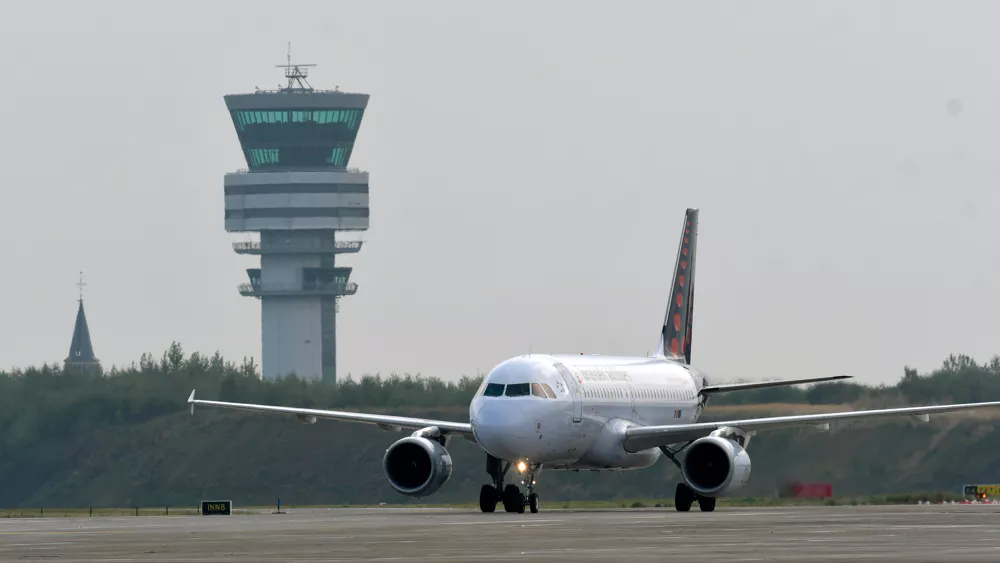
-
Brussels airport suspends flights after three drones spotted over terminal
Belgium's Brussels Airport suspended operations on the evening of 4 November following reports of unidentified drones, according to VRT NWS and Nieuwsblad. Sources told VRT NWS that three drones were spotted over the airport. The security incident forced Brussels Airlines to cancel 16 flights. Passengers were stranded at the terminal waiting for operations to resume. Drones were also detected over the Kleine Brogel military base, where American nuclear weapons are
Brussels airport suspends flights after three drones spotted over terminal

Belgium's Brussels Airport suspended operations on the evening of 4 November following reports of unidentified drones, according to VRT NWS and Nieuwsblad. Sources told VRT NWS that three drones were spotted over the airport.
The security incident forced Brussels Airlines to cancel 16 flights. Passengers were stranded at the terminal waiting for operations to resume.
Drones were also detected over the Kleine Brogel military base, where American nuclear weapons are stored. Local residents reported six UAVs in the area, though police only confirmed two, the publications report.
The base went into heightened alert status. Federal police responded to the scene and checked suspicious vehicles in the vicinity.
Belgium's Interior Minister Bernard Quintin requested Prime Minister Bart De Wever urgently convene the National Security Council following the repeated drone appearances.
"We cannot allow our airports to be disrupted by unauthorized drone flights. This requires a coordinated and national response," Quintin said.
This marks the second drone incident near Kleine Brogel in recent days. Unknown drones were spotted near the base during the night of 1 November. Kleine Brogel serves as the Belgian army's main air base and houses American nuclear weapons. The facility is scheduled to host new F-35 fighter jets starting in 2027.
-
Euromaidan Press
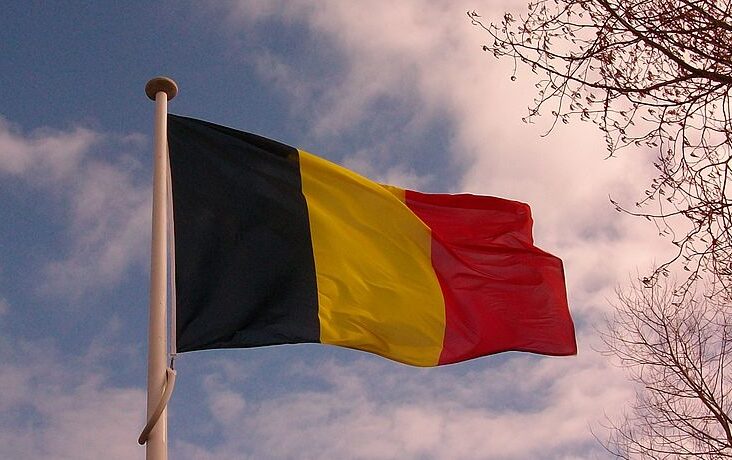
-
Belgian army gives orders to shoot down drones over military bases after 3 consecutive nights of sightings
Belgium’s armed forces have been ordered to shoot down unidentified drones flying over military installations after a series of incursions above sensitive sites, Belgian Chief of Defense Frederik Vansina said on Monday, as reported by Belgian media. There is growing concern across Europe over unidentified drones near sensitive military sites, a phenomenon that has triggered security alerts from Scandinavia to Central Europe in recent months. While Belgium has now auth
Belgian army gives orders to shoot down drones over military bases after 3 consecutive nights of sightings

Belgium’s armed forces have been ordered to shoot down unidentified drones flying over military installations after a series of incursions above sensitive sites, Belgian Chief of Defense Frederik Vansina said on Monday, as reported by Belgian media.
There is growing concern across Europe over unidentified drones near sensitive military sites, a phenomenon that has triggered security alerts from Scandinavia to Central Europe in recent months. While Belgium has now authorized direct engagement, most NATO countries have so far avoided shoot-down orders, citing the risks of misidentification, civilian harm, and escalation or diplomatic fallout.
The order follows three consecutive nights of drone sightings in Belgium, including four seen Sunday above the Kleine-Brogel air base near Peer, a NATO-linked facility. That same evening, police received reports of about a dozen drones over the Mechelen-Zuid industrial zone.
Vansina confirmed that the Belgian army’s anti-drone program is being accelerated and that a new protection plan will soon be presented to the Council of Ministers. Belgium currently has limited capacity to counter unmanned aerial vehicles, relying mainly on detection tools, jammers, and portable drone guns.
“If more drones appear above army bases, the order has been given to shoot them down,” Vansina said during a naval ceremony in Zeebrugge.
He stressed, however, that any interception must be carried out “without causing collateral damage,” a challenge given the drones’ small size and the fact that they often fly at night.
The Kleine-Brogel air base has issued safety instructions for nearby residents, urging them to report suspicious aerial activity to police and, if possible, to capture photos or video.
Local and federal police have attempted to track the drones from the ground and air, including by helicopter, but so far have been unable to locate their operators.
The repeated incursions have heightened concern across Belgium, which, like other NATO members, has seen a rise in unidentified drone activity near critical and military infrastructure in recent months.
-
Euromaidan Press
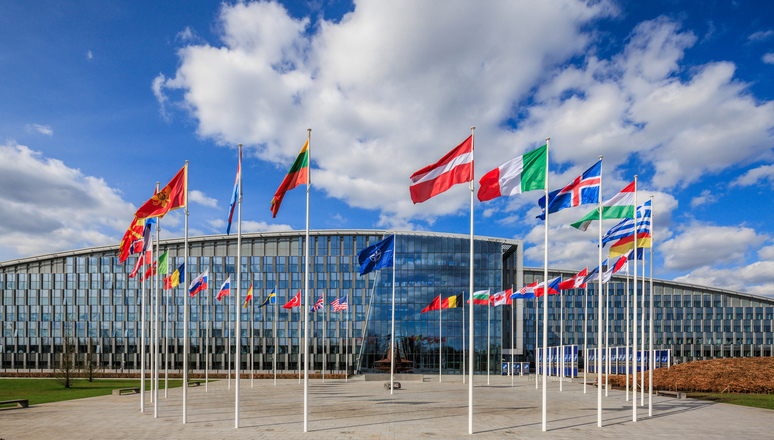
-
Belgium admits it couldn’t stop drones over F-35 base reportedly storing US nuclear weapons
Belgium, home to NATO's headquarters, has acknowledged the security problem to counter waves of drones spotted in many European states this fall. The country has admitted it is struggling to deal with the targets spying on a critical military base that hosts its advanced fighter jets, Business Insider reports. European NATO has been on high alert over airspace violations since early September, when 19 Russian drones entered Poland overnight, prompting Warsaw to activate i
Belgium admits it couldn’t stop drones over F-35 base reportedly storing US nuclear weapons

Belgium, home to NATO's headquarters, has acknowledged the security problem to counter waves of drones spotted in many European states this fall. The country has admitted it is struggling to deal with the targets spying on a critical military base that hosts its advanced fighter jets, Business Insider reports.
Theo Francken, the Belgian defense minister, said on 2 November that the country detected at least three large drones flying high above the Kleine-Brogel air base in a single night.
Drones in the sky over Kleine-Brogel, where nuclear weapons are reportedly stored
The base, in northeastern Belgium, houses the country’s fleet of F-16 Fighting Falcons, and Brussels plans to station its new F-35 Lightning II aircraft there.
It is also believed that the US stores several dozen nuclear weapons at Kleine-Brogel as part of its nuclear deterrence strategy in Europe.
Francken said that a deployed drone jammer failed to neutralize the drones. He suggested that the failure might have been caused by issues with distance or by the jammer not being tuned to the correct radio frequency.
He added that a police helicopter and several vehicles were mobilized to pursue one of the drones, but they eventually lost track of it after following the system for several kilometers.
Francken said that “additional counter-drone air systems are urgently needed.”
The Kremlin's shadow over Europe
Although he did not specify who was operating the drones, European leaders have repeatedly suggested that Russia is behind a series of recent similar incursions into NATO territory.
On 28 October, Ukrainian President Volodymyr Zelenskyy said that Russia employed oil tankers to launch and control drones targeting European nations. This way, the launch of drones may be invisible.
Drone warfare experience from Ukraine is shaping Europe's new air defense
A series of incidents has pushed Europe to look for cost-effective ways to counter enemy drones, which are often much cheaper than the interceptors NATO has traditionally relied on for aerial threats.
Some NATO allies, including Denmark and Poland, have sought to strengthen their air defenses with help from Ukraine, which frequently faces hundreds of Russian drones in a single night.
-
NYT > World News

-
The Netherlands Will Return Looted Pharoah-Era Artifact to Egypt
The 3,500-year-old artifact, likely stolen from Egypt during the Arab Spring in 2011 or 2012, was found at an elite European art fair in Maastricht.
The Netherlands Will Return Looted Pharoah-Era Artifact to Egypt

© Information and Heritage Inspectorate
-
Euromaidan Press
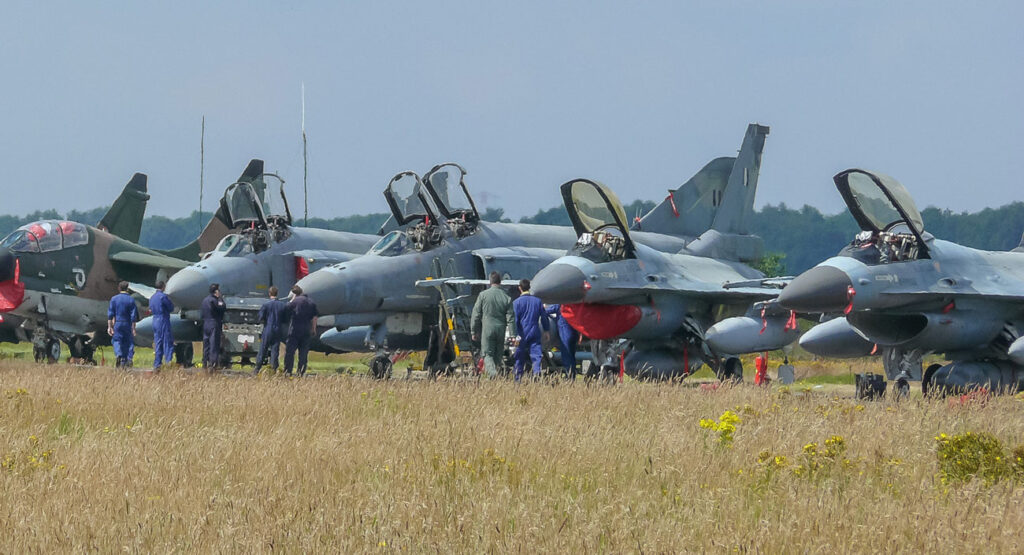
-
Unidentified drones repeatedly breach airspace over Belgium’s F-35 site storing US nukes — suspects not found
In the span of 24 hours, unidentified drones were spotted twice over Kleine-Brogel Air Base, a highly sensitive military installation in Belgium that stores US nuclear weapons. The incidents triggered aerial police responses and the use of military jamming devices, but no drone operators were located or apprehended. During the ongoing Russo-Ukrainian war, Russia has also carried out military provocations in EU airspace involving fighter jets. In addition, drones have been
Unidentified drones repeatedly breach airspace over Belgium’s F-35 site storing US nukes — suspects not found

In the span of 24 hours, unidentified drones were spotted twice over Kleine-Brogel Air Base, a highly sensitive military installation in Belgium that stores US nuclear weapons. The incidents triggered aerial police responses and the use of military jamming devices, but no drone operators were located or apprehended.
Belgian nuclear base sees two drone breaches in one day
In the early evening of 1 November 2025, around 6:30 p.m., drones were detected over Kleine-Brogel Air Base in Peer, Limburg Province, HLN reported. The site is known to house American nuclear weapons and is set to become the home of Belgium’s F-35 fighter jets starting in 2027.
Police were immediately alerted, and a helicopter was deployed to pursue the drones, which reportedly flew toward the Netherlands. Authorities were unable to intercept them or identify the drone pilots.
Belgian defense minister confirms jammer failed during incident
On 2 November, Belgian Defense Minister Theo Francken confirmed that military forces fired a drone-jamming gun in an effort to disable one of the drones. The device, which uses radio waves to disrupt drone communication, proved ineffective. Francken suggested that either radio frequency mismatches or distance may have rendered the jammer useless.
He stated earlier on X that the drones observed overnight were of a larger type and appeared to have a "clear mission" targeting Kleine-Brogel specifically, rather than being accidental overflights. He also confirmed that detection systems had picked up the drone presence and thanked the base guard team for its vigilance. A local resident captured video footage of a drone near the base, which circulated in Belgian media.
More bases targeted in growing pattern
Drones were also seen overnight near the military area in Leopoldsburg, which lies close to Kleine-Brogel, Belga said.
The drone incidents in Limburg follow similar suspicious flights last month over a military base in Elsenborn.
Previously, unidentified drones have been sighted twice over the military base in Marche-en-Famenne in southern Belgium.
No suspects have been identified in any of the recent incidents.
-
Euromaidan Press

-
Why did Belgium block €193 billion for Ukraine—and collect €1.7 billion instead?
The dysfunction reveals a fundamental problem: national interests trump collective commitments, and the delay isn’t just postponing help—it’s watching that help evaporate. Belgium blocked the EU plan at the October summit. Every month spent arguing means less money for Ukraine, because falling interest rates steadily reduce what those frozen assets can earn. What peaked at €6.9 ($8) billion in earnings last year is trending toward €5 ($5.8) billion this year. By
Why did Belgium block €193 billion for Ukraine—and collect €1.7 billion instead?

The dysfunction reveals a fundamental problem: national interests trump collective commitments, and the delay isn’t just postponing help—it’s watching that help evaporate.
Belgium blocked the EU plan at the October summit. Every month spent arguing means less money for Ukraine, because falling interest rates steadily reduce what those frozen assets can earn. What peaked at €6.9 ($8) billion in earnings last year is trending toward €5 ($5.8) billion this year.
By the time Europe agrees on a mechanism—if it ever does—there might not be much left.
Euroclear, the Brussels company holding most of Europe’s frozen Russian assets, reported €3.9 ($4.5) billion in interest earnings through September 2025—down from €6.9 ($8) billion for all of 2024. Falling European interest rates are the culprit, and Euroclear warns the decline will continue as central banks cut further.
Translation: Every month the EU spends arguing means less money reaches Ukraine’s defense. And that’s assuming they ever agree at all.
The money keeps shrinking
When interest rates climbed in 2022, those frozen assets earned just €821 ($952) million. By 2023, they earned €4.4 ($5.1) billion; in 2024, they earned €6.9 ($8) billion.
That peak already passed. This year’s €3.9 ($4.5) billion through three quarters means the annual total will fall well short of last year—possibly to €5 ($5.8) billion or less.
Central banks are cutting rates across Europe, directly reducing what frozen Russian cash can earn.
According to British economist Timothy Ash, Ukraine needs an estimated $100-150 billion annually to sustain its defense and economy. The existing G7 loan program uses only windfall profits to provide $50 billion. As interest rates fall, even that limited stream is drying up.
Belgium blocked progress at the October 23-24 Brussels summit. EU leaders vowed financial backing for Ukraine but held off on the frozen assets plan, setting a vague December deadline instead.
Belgium’s real objection: control, not just cash
Belgium’s resistance makes sense when you consider what it stands to lose. The Belgian government owns 12.92% of Euroclear—9.85% directly through the Federal Holding and Investment Company and 3.07% through a consortium of seven Belgian institutions.
In 2024 alone, Belgium collected €1.7 ($1.97) billion in corporate taxes from Euroclear’s earnings on frozen Russian assets.
Belgian Prime Minister Bart De Wever notes that Belgium spends this tax revenue on Ukraine aid.
But that framing misses the point. Under the current system, Belgium collects the taxes and decides how, when, and whether to spend that money on Ukraine—giving Brussels leverage and control. Under the proposed EU loan mechanism, earnings flow directly to Ukraine through the EU framework.
Belgium would lose the revenue and the ability to control it. And there’s no verification of whether Belgium spends the full €1.7 ($1.97) billion on Ukraine, or how much goes to other priorities.
Euroclear’s balance sheet shows €227 ($263) billion in total assets as of September 2025, with €193 ($223.9) billion representing sanctioned Russian holdings. The company processes over €1 ($1.16) quadrillion in transactions annually and reported €1.4 ($1.6) billion in underlying business income for the first nine months of 2025—a 7% year-on-year increase in its core operations.
De Wever demands three conditions before supporting the asset-backed loan: transparency about frozen assets in other EU countries (France holds roughly €19 ($22) billion, Luxembourg €10 ($11.6) billion), legally binding risk-sharing guarantees from all member states, and a solid legal basis for the mechanism.
One country, 27 hostages
Belgium’s obstruction reveals a structural problem in European decision-making. When collective action requires unanimous agreement, any member state can hold the process hostage for national interests. The frozen assets plan needs Belgium because Euroclear holds 86% of Europe’s Russian holdings.
Without Belgium’s cooperation, there is no plan.
This isn’t unique to Belgium. Similar dynamics played out over energy sanctions, military aid packages, and financial support mechanisms throughout the war. Individual countries leveraged their veto power to extract concessions, delay decisions, or water down commitments—all while proclaiming unwavering support for Ukraine.
The gap between rhetoric and action has real costs.
Each month of delay doesn’t just postpone help—it reduces the available help, as falling interest rates steadily diminish what frozen assets can generate.
Euroclear’s risk claims don’t add up
Euroclear reported direct costs of €82 ($95) million from implementing sanctions in the first nine months of 2025, plus €25 ($29) million in lost business income. The company faces 94 legal proceedings in Russian courts seeking to access blocked assets, and Euroclear states, “the probability of unfavorable rulings in Russian courts is high.”
But the transparency problem cuts both ways. Euroclear has contributed around €5 ($5.8) billion to the European Fund for Ukraine, yet it has retained significant profits “as a buffer against current and future risks.”
The company’s Common Equity Tier 1 capital ratio stands at 61%—well above regulatory requirements—suggesting its capital position remains extraordinarily strong despite the claimed risks.
That €107 ($124.4) million in claimed costs and losses looks modest next to €1.7 ($2) billion in taxes Belgium collected, or the €3.9 ($4.5) billion Euroclear earned from frozen assets this year alone.
The gap between promises and actions
EU leaders tasked the European Commission with presenting “options for financial support” for Ukraine’s 2026-2027 needs at the December summit. The watered-down language—agreed by all member states except Hungary—shows Belgium’s success in diluting earlier drafts that would have committed to the €140 ($162.8) billion reparation loan.
Poland’s Prime Minister Donald Tusk insisted December must be the “final deadline” for a decision. Germany’s Chancellor Friedrich Merz backed the loan as necessary to prevent Berlin from shouldering Europe’s Ukraine costs alone.
However, the mechanism could not function without Belgium’s cooperation.
The situation exposes how individual national interests can derail collective commitments, even with enormous stakes. Europe’s leaders can debate how to structure the loans, who bears the risk, and how to compensate Belgium. But while they talk, the window of opportunity is closing. The clock is ticking, and with every month of delay, there’s less money to argue about.
-
NYT > World News

-
Pumpkin Spice Lattes, a Favorite U.S. Fall Drink, Divide Europe
One of America’s favorite fall drinks shows up in Brussels and Antwerp, but rarely in Paris and Rome. It has yet to reach the ubiquity — or the sugar content — of its stateside counterpart.
Pumpkin Spice Lattes, a Favorite U.S. Fall Drink, Divide Europe

© Jim Huylebroek for The New York Times
-
Euromaidan Press
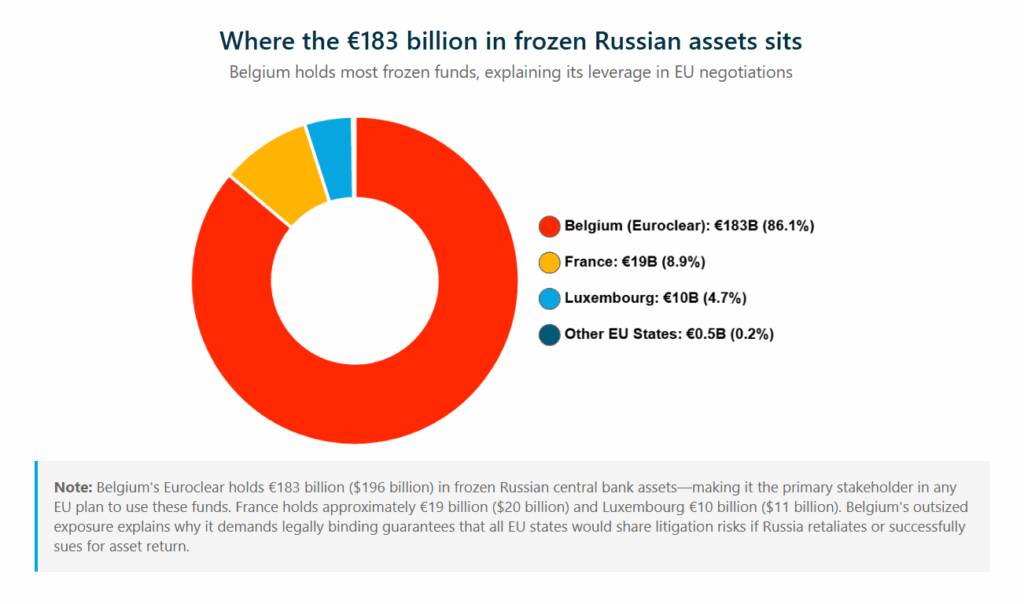
-
Frozen billions, frozen will: Belgium stops Europe’s Russian assets plan cold
Belgium blocked the EU’s plan to use €183 billion ($196 billion) in frozen Russian assets to fund Ukraine at the October 23-24 Brussels summit, refusing to move forward until other member states provide legally binding guarantees they’ll share litigation risks if Russia retaliates or sues for asset return. The summit concluded with leaders asking the European Commission to prepare “options for financial support” for Ukraine through 2027—language considerably weaker th
Frozen billions, frozen will: Belgium stops Europe’s Russian assets plan cold

Belgium blocked the EU’s plan to use €183 billion ($196 billion) in frozen Russian assets to fund Ukraine at the October 23-24 Brussels summit, refusing to move forward until other member states provide legally binding guarantees they’ll share litigation risks if Russia retaliates or sues for asset return.
The summit concluded with leaders asking the European Commission to prepare “options for financial support” for Ukraine through 2027—language considerably weaker than the €140 billion ($150 billion) “reparations loan” that Germany and Poland had pushed heading into the meeting.
Belgium, which holds most frozen Russian funds through Brussels-based Euroclear, would not accept sole responsibility for potential Russian retaliation or international legal challenges.
Why this matters
Ukraine spends $172 million daily on defense. Within weeks of the February 2022 invasion, Europe froze €183 billion ($196 billion) in Russian central bank assets, yet has managed to transfer only interest earnings—not the principal—to Ukraine. The existing G7 loan program, using only windfall profits, provides a $50 billion total—far short of Ukraine’s estimated $100-150 billion annual requirement, according to British economist Timothy Ash.
Germany’s Friedrich Merz warned that without the frozen assets mechanism, Berlin fears being left to shoulder Europe’s Ukraine costs alone.
Polish Prime Minister Donald Tusk insisted December must be the “final deadline” for a yes-or-no decision.
If the December summit fails to break the deadlock, Ukraine will remain dependent on annual aid packages subject to parliamentary approval and the six-month sanctions renewal cycle. Hungary or other member states can threaten to veto either.
Without mobilizing the Russian assets principal, European defense support would continue through national budgets at current levels: Germany allocated €7.1 billion ($7.6 billion) for Ukraine in 2024, France €3 billion ($3.2 billion), and most other EU states contributed under €1 billion ($1.1 billion) annually.
Three core demands
According to Belgian Prime Minister Bart De Wever’s statements at the summit, when European Council President António Costa said the bloc must “work out the technical, legal, and financial details,” he was referring to Belgium’s three core demands.
Technical aspects: Belgium wants transparency about which other countries hold frozen Russian assets and how much. While Euroclear holds €183 billion ($196 billion), France has roughly €19 billion ($20 billion) and Luxembourg €10 billion ($11 billion), according to European Parliament research. De Wever demanded these countries contribute their share:
“The fattest chicken is in Belgium but there are other chickens around.”
Legal aspects: The Commission must establish what De Wever called a “solid legal basis” for converting frozen assets into loan collateral without technically confiscating them. The proposed mechanism would transfer Russian cash to a Special Purpose Vehicle in exchange for zero-coupon bonds—essentially swapping liquid money for IOUs that generate no interest. This allows Brussels to claim Russia still “owns” bonds of equal face value, making it legally distinct from outright confiscation.
Belgium disputes this distinction. As De Wever argued earlier this month:
“If I take your money and I use it, I think you will say that’s a confiscation.”
Belgium fears facing arbitration claims in international courts—potentially before judges in Singapore, Hong Kong, or other jurisdictions where Russia maintains legal standing—and being ordered to return billions while other EU states avoid liability.
Financial aspects: Belgium demands legally binding guarantees—not just political assurances—that all EU member states would share the cost if Russia successfully sues for asset return or if the money must be repaid after a potential peace deal. German Chancellor Merz indicated Germany expects to contribute proportionally by economic size, but Hungary has already said it will not offer guarantees.
Belgium also faces losing €1.3 billion ($1.4 billion) annually in corporate tax revenue from Euroclear’s earnings on the frozen funds—money it currently spends on Ukraine aid. De Wever wants compensation for this loss included in any deal.
An unchanged position
The summit text represents a successful Belgian effort to water down earlier language that would have called for a concrete legal proposal.
Belgium agreed not to block the EU from continuing work on the idea, but this falls far short of actual commitment.
Since early October, De Wever has maintained that Belgium fears facing arbitration claims in international courts and being exposed to Russian retaliation while other member states avoid consequences. Commission President Ursula von der Leyen assured reporters that “the risks have to be put on broader shoulders,” but acknowledged the bloc still needs to work out how to make that happen in practice.
Contrasting success
The summit’s paralysis on frozen assets stood in sharp contrast to leaders’ ability to approve the EU’s 19th sanctions package against Russia, including a ban on Russian liquified natural gas imports starting in 2027 and additional restrictions on the “shadow fleet” Moscow uses to evade oil sanctions.
For the first time, the EU sanctioned two Chinese refineries that were processing and selling Russian oil.
These measures followed the United States hitting two Russian fossil fuel giants with sanctions—a move French President Emmanuel Macron called “a true turning point,” noting that “until now, the US had refused.”
Ukrainian President Volodymyr Zelenskyy, who attended the summit, told reporters Ukraine needs the money in 2026, “and better to have it at the beginning of the year, but I don’t know if it’s possible.”
The December reckoning
The December summit will determine whether the Commission’s legal and financial proposals can satisfy Belgium’s demands for concrete, legally binding risk-sharing commitments. If they cannot, the €183 billion ($196 billion) principal will remain frozen—a gap between Europe’s stated support and its willingness to act that has persisted for more than three years since the assets were first immobilized in April 2022.
If Brussels pursues the plan, Russia has threatened a “very painful, very harsh” response.
Russia’s specific retaliation options include seizing Western corporate assets still operating in Russia (estimated at over €200 billion), targeting European financial institutions in international courts, or weaponizing energy supplies to countries still dependent on Russian gas.
-
Euromaidan Press
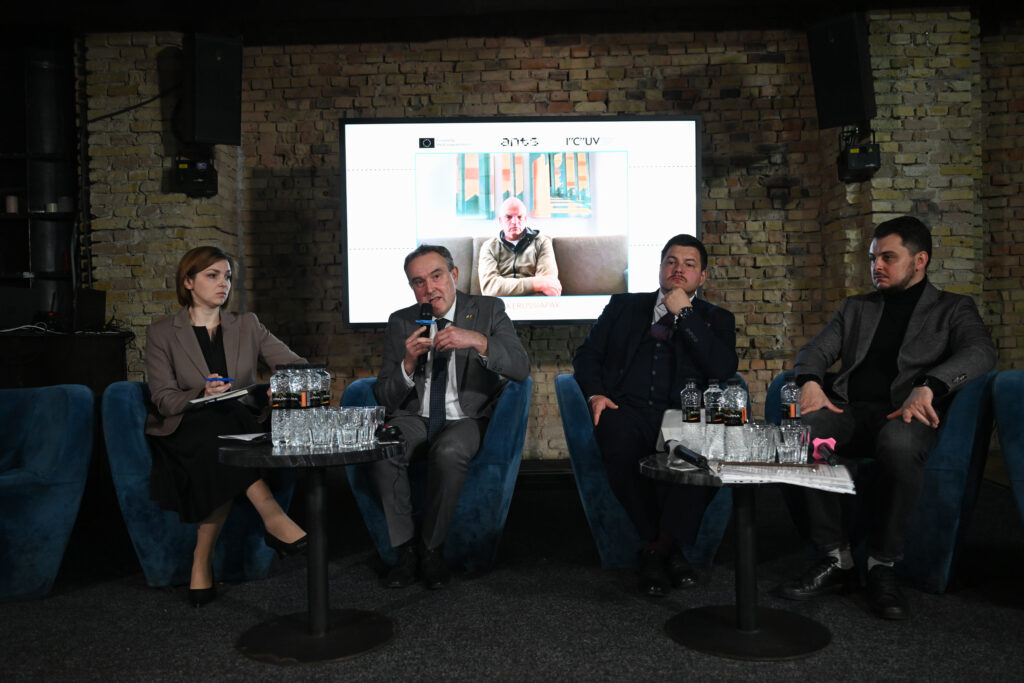
-
Frozen assets, hot politics: How Brussels fell for its own fear fantasy
Belgian Ambassador Luc Jacobs sat in a Kyiv conference room on 17 October at the “Money for Victory” conference organized by the International Centre for Ukrainian Victory (ICUV) and the National Interests Advocacy Network (ANTS), defending his government’s position to a room full of skeptical Ukrainian advocates.Via video from Washington, D.C., British economist and financial markets analyst Timothy Ash wasn’t buying it. Europe froze €183 billion ($196 billion) in Ru
Frozen assets, hot politics: How Brussels fell for its own fear fantasy

Belgian Ambassador Luc Jacobs sat in a Kyiv conference room on 17 October at the “Money for Victory” conference organized by the International Centre for Ukrainian Victory (ICUV) and the National Interests Advocacy Network (ANTS), defending his government’s position to a room full of skeptical Ukrainian advocates.
Via video from Washington, D.C., British economist and financial markets analyst Timothy Ash wasn’t buying it.
Europe froze €183 billion ($196 billion) in Russian central bank assets in April 2022—the decisive legal step that cut Moscow off from the money. Since then, Belgium has collected €1.7 billion ($1.8 billion) in taxes on windfall profits from those frozen assets, money it pledged to use for Ukraine aid.
However, the bulk remains locked in Brussels, blocked by Belgium’s insistence that other EU members must first guarantee they’ll share litigation risks. As Ash bluntly explained, the problem is that Belgium is closing a barn door that’s been open for three years.
“There’s zero evidence anyone moved reserves”
“The decisive message was already sent in April 2022 when assets were first immobilized,” Ash said. “Russia will never recover these resources unless it pays reparations.”
He pointed to the $7 trillion global foreign exchange reserves in European and American markets. China didn’t pull its money. Saudi Arabia didn’t either. Major reserve holders “don’t trust each other,” and more importantly, there are no liquid markets capable of absorbing that volume.
Belgium’s fears of retaliation? Economically illogical, Ash argued. If countries like Saudi Arabia sold European or US bonds in protest, global interest rates would rise, growth would fall, and oil prices would collapse—” which will massively hurt the Saudi Arabian budget.”
Ambassador Jacobs held his ground. “We have to stay within the law because that is the big principle that you are fighting for as well,” he said, noting concerns about maintaining trust in the European financial system.
Belgium’s position isn’t opposition, he stressed, but caution.
The decision must be “legally tight, legally sound” to avoid causing Europe more harm than it inflicts on Russia.
Five days later, nothing had changed.
Hundreds of billions in limbo
The standoff centers on Euroclear, a Brussels-based securities depository holding €183 billion ($196 billion) in immobilized Russian central bank assets. Belgium, where Euroclear operates and the government has a 12% stake, demands that other EU members guarantee they will share litigation risks before the assets back loans to Ukraine.
As reported by Euractiv on 22 October, Belgium, along with Luxembourg and the European Central Bank, remains “considerably more cautious” about the EU’s proposed €140 billion ($150 billion) reparation loan mechanism. According to EU diplomats, the Commission’s three-page briefing note to EU ambassadors failed to address Belgium’s demand for “strong and clear text” that “needs to be legally binding” on risk-sharing.
Belgium worries about Russian retaliation.
Russia holds blocked foreign accounts worth roughly a quarter-trillion rubles that could be nationalized in response, potentially creating capital holes for Euroclear. Belgium’s government has stated that breaching international financial rules would expose Belgium and the EU, as investors might reconsider investments in European markets.
But Ash challenged conference participants directly: “If you don’t want to do this, tell us exactly how you propose to fill the hundred billion a year funding requirement of Ukraine.”
Ukraine makes its case
Ukrainian officials argue this isn’t charity but justice. Mykola Yurlov from Ukraine’s Ministry of Foreign Affairs, outlined what Ukrainian officials characterize as a legally sound mechanism: a “reversible transfer” rather than confiscation, where the transferred amount would be subtracted from the over $1 trillion Russia owes Ukraine through a “set off” mechanism under international law.
“International law is very clear about this,” Yurlov said. “You can take the assets of another state if that state is waging a war against the international order.”
He emphasized that highly qualified international law professors have written detailed legal memoranda demonstrating the permissibility of this approach through the counter-measures doctrine.
The November 2022 UN General Assembly resolution, supported by 94 states, affirmed that Russia must bear legal consequences for its aggression, including compensation for all damage. Ukraine has since launched a Register of Damage with more than 60,000 claims registered.
Negotiations concerning a Claims Commission were recently finalized in The Hague, with a convention establishing the Commission set for adoption on 16 December.
But Iryna Mudra, Deputy Head of the Office of the President of Ukraine, described the reparation mechanism as “a bridge between immediate needs and the full transfer of frozen assets to Ukraine”—and then outlined demands that would challenge standard international lending practices.
Ukraine insists on receiving funds with no conditionality on how they will be used, complete autonomy in prioritizing expenditures, and the ability to direct major portions to defense, including personnel costs.
The cost of delay
According to Ash’s estimates, Ukraine requires $100-150 billion annually to sustain its defense and economy. Nonetheless, the G7’s existing Economic Resilience Activity (ERA) loans program, which Euroclear has already funded with €1.6 billion ($1.7 billion) in its third tranche, provides only $50 billion total using interest income from frozen assets rather than the principal.
The proposed reparation loan would tap into the €140-175 billion ($150-187 billion) in matured Russian assets at Euroclear, providing multiyear funding certainty. Germany’s Chancellor Friedrich Merz backed the plan as an interest-free loan repayable only once Russia compensated Ukraine for war damages, driven partly by fears that Germany would otherwise shoulder Europe’s Ukraine costs alone.
“The bigger risk to Europe is not doing this,”
Ash said, warning that if Ukraine loses due to insufficient funding, European countries like Belgium would face immediate defense spending increases to 5% of GDP—up from current levels of 2.3-2.7%—resulting in higher interest rates, lower growth, and increased social unrest.
Russia has caused more than $1 trillion in damage to Ukraine since 2014, according to European Investment Bank calculations.
A dangerous vulnerability
Andriy Mikheiev, another Ukrainian legal expert at the conference, highlighted a separate structural problem: EU sanctions against Russia require unanimous renewal every six months. If even one member state—and participants noted Hungary’s consistent opposition to Ukraine support—votes against renewal, Russian assets would be “transmitted back to Russia” within a month.
He pointed out that EU guidelines officially recognize an alternative approach where sanctions automatically continue unless evidence shows objectives have been reached, requiring only qualified majority voting to lift them.
“This is officially adopted and this is really surprising why it’s not applied by the Council of the European Union,” Mikheiev said.
The six-month renewal cycle means both the existing ERA loans program (which uses only windfall profits from frozen assets) and any future reparation loan face recurring political risk. “Each half of the year shall be a big surprise, not in a good way surprise, for Ukraine, for the European Union, for the international community,” Mikheiev warned.
Stuck in neutral
European Pravda reported on 21 October that Belgium agreed not to block the EU idea, with EU leaders asking the European Commission to draft a concrete proposal. However, Euractiv noted that the Commission’s briefing note failed to quell Belgium’s concerns.
The country seeks guarantees that other EU members will share legal and financial liability, insisting on legally binding commitments rather than political assurances.
Yurlov concluded his conference remarks by framing the issue as fundamentally political rather than technical: “There is no impediment from the legal or economic standpoint to address this reparation loan. The only question is the political will. What we’re asking about partners is to be at least half as brave as our defenders are sacrificing their lives not only for Ukraine but for the future of Europe and the world.”
The asymmetry remains stark: Europe has already channeled €3.55 billion ($3.8 billion) in windfall profits to the European Fund for Ukraine through the ERA loans program during 2024 alone. Belgium collected €1.7 billion in taxes.
Yet, the underlying principal of €140-175 billion sits frozen, blocked by demands for guarantees against consequences that, according to Ash’s analysis, already occurred when Europe made its choice in April 2022.
-
NYT > World News

-
Can Europe Agree on Turning Frozen Russian Assets Into Cash for Ukraine?
European Union officials want to make a large loan to Ukraine backed by Russian state assets, but on Thursday, they deferred any clear decision on that plan to December.
Can Europe Agree on Turning Frozen Russian Assets Into Cash for Ukraine?

© Tyler Hicks/The New York Times
-
Euromaidan Press
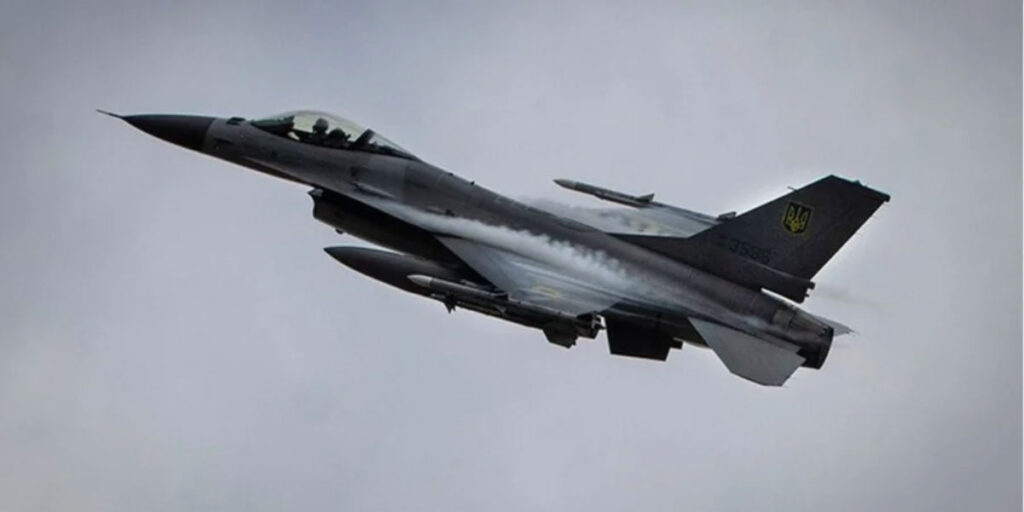
-
Belgian defense chief says Ukraine to receive F-16s in 12-18 months
Belgium will transfer its F-16 fighter jets to Ukraine once the country receives and operationalizes its new F-35 aircraft, Defense Minister Theo Francken said on 21 October at the European Policy Centre forum, according to Radio Liberty. "We continue to receive deliveries on schedule: the first three F-35s (not four) have already arrived. Now they need to become operational – I think that will take a year or a year and a half. When we achieve operational capability,
Belgian defense chief says Ukraine to receive F-16s in 12-18 months

Belgium will transfer its F-16 fighter jets to Ukraine once the country receives and operationalizes its new F-35 aircraft, Defense Minister Theo Francken said on 21 October at the European Policy Centre forum, according to Radio Liberty.
"We continue to receive deliveries on schedule: the first three F-35s (not four) have already arrived. Now they need to become operational – I think that will take a year or a year and a half. When we achieve operational capability, we will be able to transfer our F-16s to Ukraine," Francken said.
The minister emphasized that deploying the F-35s represents a critical phase for the Belgian Air Force and is directly linked to the transfer of aircraft to Ukraine.
"As soon as we can – we will transfer. But don't forget that our country has DCA (Defensive Counter Air) capabilities and plays an important role in NATO's nuclear deterrence policy. This is the cornerstone of our doctrine," Francken stated.
Belgium is part of a coalition preparing to transfer F-16 fighters to Ukraine. Francken had previously said Brussels would "try to do this even earlier than the planned deadline," though he did not specify an exact date.
According to the Belgian government, the aircraft transfer depends on the delivery schedule of new F-35s and is preliminarily expected in 2026.
In March, the Belgian government reported delays in F-16 deliveries to Ukraine due to postponed F-35 shipments from the United States to Belgium.
Read also
-
Lithuania tests heavy machine guns and missiles against drones 10km from Belarus border
-
Zelenskyy says Russia “doesn’t feel enough pressure” to end war as four killed in Kyiv Oblast strikes, including two children
-
Lithuania tests heavy machine guns and missiles against drones 10km from Belarus border
-
The Kyiv Independent
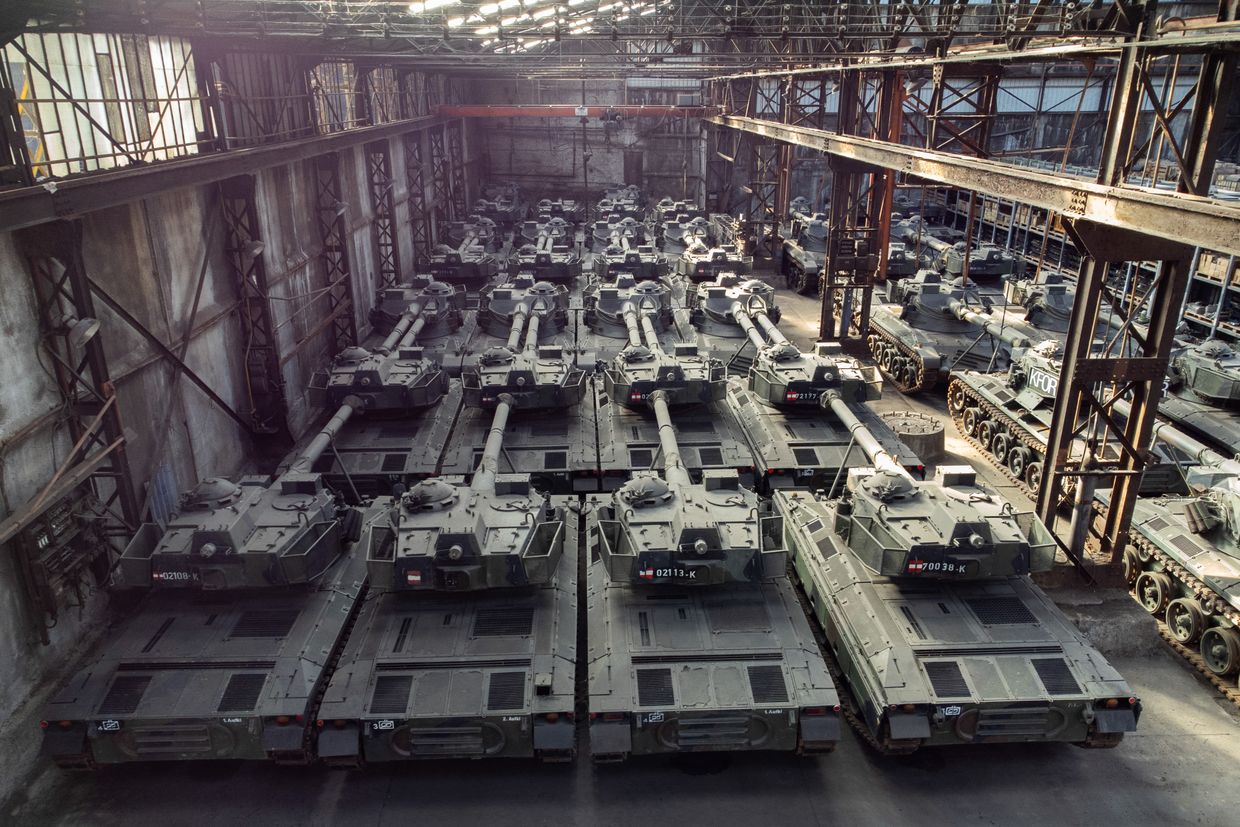
-
Pro-Palestinian activists reportedly destroy military equipment intended for Ukraine
Around 150 pro-Palestinian activists have broken into a storage facility and damaged military equipment intended for Ukraine, the Belgian news outlet 7sur7 reported on June 26.The facility belongs to OIP Land Systems, a company that produces military equipment for Ukraine. The activists reportedly thought the equipment would be supplied to Israel.The activists, who were wearing white overalls and masks, took part in the Stop Arming Israel campaign. The protests seek to pressure Belgian authoriti
Pro-Palestinian activists reportedly destroy military equipment intended for Ukraine

Around 150 pro-Palestinian activists have broken into a storage facility and damaged military equipment intended for Ukraine, the Belgian news outlet 7sur7 reported on June 26.
The facility belongs to OIP Land Systems, a company that produces military equipment for Ukraine. The activists reportedly thought the equipment would be supplied to Israel.
The activists, who were wearing white overalls and masks, took part in the Stop Arming Israel campaign. The protests seek to pressure Belgian authorities to maintain the military embargo against Israel and impose sanctions on it.
The protesters, armed with hammers and grinders, first entered the company's offices, where they smashed computers, and then broke into the hangars, where they severely damaged some vehicles, Freddy Versluys, CEO of OIP Land Systems, said.
Since the beginning of the Russian invasion, the company has supplied the Ukrainian army with about 260 armored vehicles. The damage caused by the activists' actions is estimated at $1.1 million, according to 7sur7.
"A further delivery has now been delayed by at least a month. That's all these Hamas sympathizers will have achieved with their action," Versluys said.
The company was reportedly targeted by pro-Palestinian protesters because Elbit Systems, an Israeli defense company, owns it.
Protesters believe that Elbit supplies 85% of the drones and most of the ground military equipment used by the Israel Defense Forces, 7sur7 reported.
Yet, the OIP Land Systems CEO claimed that his company has not produced defense systems for Israel for over 20 years.
OIP Land Systems has provided defense products to Ukraine on several occasions, including Leopard 1 tanks, which are manufactured at the Tournai plant.
 The Kyiv IndependentKateryna Hodunova
The Kyiv IndependentKateryna Hodunova
-
The Kyiv Independent

-
Netherlands, Belgium hand over 2 minehunters to boost Ukraine’s naval defenses
The Netherlands and Belgium have delivered two minehunter vessels to Ukraine to support maritime security in the Black Sea, Dutch Defense Minister Ruben Brekelmans announced on June 26."The Netherlands and Belgium are transferring two minehunters to Ukraine. A vital contribution to Black Sea security, and key to safeguarding trade routes and global food supply," Brekelmans said on X. He added that Ukrainian crews and technicians were trained "in record time." According to the Dutch Defense Minis
Netherlands, Belgium hand over 2 minehunters to boost Ukraine’s naval defenses

The Netherlands and Belgium have delivered two minehunter vessels to Ukraine to support maritime security in the Black Sea, Dutch Defense Minister Ruben Brekelmans announced on June 26.
"The Netherlands and Belgium are transferring two minehunters to Ukraine. A vital contribution to Black Sea security, and key to safeguarding trade routes and global food supply," Brekelmans said on X. He added that Ukrainian crews and technicians were trained "in record time."
According to the Dutch Defense Ministry, the vessels involved are the Belgian ship BNS Narcis and the Dutch Zr.Ms. Vlaardingen. The official handover ceremony took place earlier in Zeebrugge, Belgium, but was disclosed only later due to security concerns.
"The major ports of Odesa and the Black Sea shipping lanes are the lifeblood of the Ukrainian economy," Brekelmans said. "And (they are) under constant threat. Ukraine may not win the war at sea, but it can certainly lose the war there. We simply cannot let that happen. That is why it is so important for maritime security and free passage that Ukraine can use minehunters."
Since Russia's full-scale invasion of Ukraine began in February 2022, the Netherlands has provided Kyiv with a combined 8.4 billion euros ($9.4 billion) in support, according to the Kiel Institute for the World Economy while Belgium has allocated over two billion euros (about $2.2 billion) in support, including military, financial, and humanitarian assistance.
 The Kyiv IndependentChris York
The Kyiv IndependentChris York